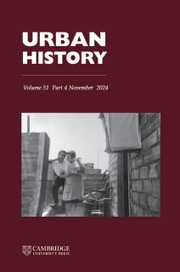Article contents
Performing their right to the city: political uses of public space in a Mexican city, 1880–1910s
Published online by Cambridge University Press: 02 January 2007
Abstract
As public spaces, such as plazas and parks, were increasingly aestheticized and commercialized in late nineteenth-century Mexico, these visual and accessible shared spaces became subject to the competing visions of different urban groups. This article argues that these transformed public spaces enabled a wide range of city residents, not just the elite class, to assert their own claims to the city. Street vendors and petty entrepreneurs, in particular, found the opportunity to demonstrate their contributions to public aesthetics, the local economy and consumer needs, while simultaneously claiming their rights as political actors and their identity as civic-minded residents. Through a close analysis of letters written by working residents, the article suggests how enterprising men and women performed their ‘public civility’, ‘honest occupation’ and ‘morality’ in the ‘Lettered City’ through their written dialogues with municipal and state officials. These exchanges also reveal how the slippage between the categories of vecino (literally, neighbour) and cuidadano (literally, citizen) functioned in the everyday politics of the provincial Mexican city, highlighting how citizenship in Mexico was not just an outgrowth of nineteenth-century liberalism, but also rooted in local customs and much earlier historical notions of community membership.
- Type
- Research Article
- Information
- Copyright
- © 2006 Cambridge University Press
- 3
- Cited by




